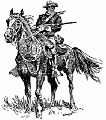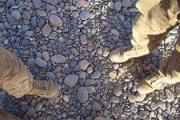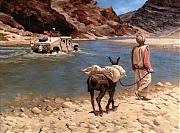A few weeks ago a highly unusual ceremony took place at the Pentagon.
David Kilcullen, one of Australia's leading counter-terrorism experts, had come to receive a medal awarded by US Defence Secretary Donald Rumsfeld.
The Defence Department's Medal for Exceptional Public Service cited Dr Kilcullen's "exceptional service" as special adviser for irregular warfare and counter-terrorism during the 2005 Quadrennial Defence Review.
For Kilcullen, 40, one of the Australian army's most brilliant graduates, it was another milestone in a career that has catapulted him into the highest corridors of power in Washington.
Uniquely, for an Australian citizen, Kilcullen has emerged as a key adviser to US President George W. Bush, Secretary of State Condoleezza Rice and Rumsfeld in the war on terror. His influence in Washington arguably oustrips that of the only other Australian to reach high office in the US, Martin Indyk, the former US ambassador to Israel.
Over the past year, working out of the US State Department, Kilcullen has flown on secret assignments into the world's terrorist hot-spots from Iraq and Afghanistan to the Horn of Africa, Indonesia and The Philippines.
A primer he wrote on fighting counter-insurgency warfare for junior officers now forms part of the US army's basic war doctrine, and has been translated into Russian, Arabic, Pashtu and Spanish.
"It's unprecedented," Hank Crumpton, the State Department's counter-terrorism chief, told The Australian in reference to Kilcullen's special role in his office.
"I am the adviser to Secretary Rice on counter-terrorism, and David is my principal strategist."
Leading US strategic thinker Eliot A. Cohen, from the Johns Hopkins School of Advanced International Studies said: "I cannot think of a non-American who has had so much influence in the US national security establishment - and from within, noless."
Working closely with the Pentagon and the CIA, Kilcullen has led counter-insurgency teams in the field in Iraq and Afghanistan, observing at close quarters the US-led efforts to stabilise the two countries and Washington's battle against al-Qa'ida and its affiliates.
He has stalked around the Arabian Gulf and Pakistan's North-west Frontier studying counter-insurgency warfare and learning new insights into the culture of Islamist terror groups.
A fortnight ago, Kilcullen returned to Washington from Kabul, where he helped teach counter-insurgency and counter-terrorism techniques to officers and NCOs of the fledgling Afghan army, as well as soldiers in the NATO-led coalition.
Combining his Australian army experience with a PHD on the political anthropology of the Indonesian post-1945 Islamist insurgent movement, Darul Islam, Kilcullen first took leave from Australia's Defence Department in 2004 to help the Pentagon with the drafting of last year's Quadrennial Defence Review, which determines the US's global defence strategy.
Working inside the Pentagon in 2004, Kilcullen founded and led the US Government's inter-agency Irregular Warfare Working Group....
Originally Posted by jcustis











Bookmarks